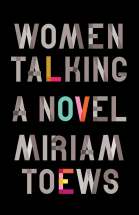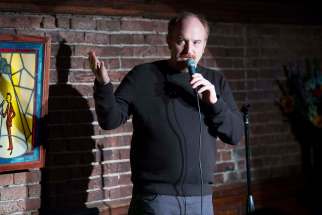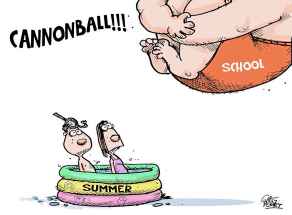Comebacks are complicated in the #MeToo age
Read this article for free:
or
Already have an account? Log in here »
To continue reading, please subscribe:
Monthly Digital Subscription
$0 for the first 4 weeks*
- Enjoy unlimited reading on winnipegfreepress.com
- Read the E-Edition, our digital replica newspaper
- Access News Break, our award-winning app
- Play interactive puzzles
*No charge for 4 weeks then price increases to the regular rate of $19.00 plus GST every four weeks. Offer available to new and qualified returning subscribers only. Cancel any time.
Monthly Digital Subscription
$4.75/week*
- Enjoy unlimited reading on winnipegfreepress.com
- Read the E-Edition, our digital replica newspaper
- Access News Break, our award-winning app
- Play interactive puzzles
*Billed as $19 plus GST every four weeks. Cancel any time.
To continue reading, please subscribe:
Add Free Press access to your Brandon Sun subscription for only an additional
$1 for the first 4 weeks*
*Your next subscription payment will increase by $1.00 and you will be charged $16.99 plus GST for four weeks. After four weeks, your payment will increase to $23.99 plus GST every four weeks.
Read unlimited articles for free today:
or
Already have an account? Log in here »
Hey there, time traveller!
This article was published 31/08/2018 (2659 days ago), so information in it may no longer be current.
In the court of public opinion, judgment tends to be handed down swiftly and unequivocally.
The sentences, however, are usually short and arbitrary.
This week, comedian Louis C.K. made an unannounced appearance at the Comedy Cellar in New York City. It was his first public performance since November 2017, when he admitted, in a statement, to exposing himself and masturbating in front of women without their consent. And with that admission, he joined Harvey Weinstein, Matt Lauer, Kevin Spacey and many others in the ever-swelling ranks of famous men accused of sexual misconduct as part of the #MeToo movement.
“I will now step back and take a long time to listen,” Mr. C.K. said at the time.
A “long time,” it turns out, is roughly nine months.
If the cases of rapper Chris Brown and actor Mel Gibson have taught us anything, it’s that apology tours and “comebacks” are inevitable. But Mr. C.K.’s surprise appearance raises the question: how soon is too soon, or if they should be permitted back onto our stages and screens at all? Should they be given a second chance? Or should they be punished in perpetuity?
”Hasn’t he suffered enough?” one might ask. But maybe a better question is: has he suffered at all? What price has Mr. C.K. paid, exactly, when all he’s really done is taken a nine-month vacation to the time-out step?The very idea that Mr. C.K.’s unannounced performance has been referred to as a “comeback” is, in itself, offensive. The term suggests a triumphant return from some tragic setback, when in fact he is an assailant whose victims continue to suffer the trauma of his misdeeds, both emotionally and professionally.
The #MeToo movement has been effective at holding powerful men to account in a way that feels, on its face, satisfyingly swift. Those accused have lost their positions of power. They’ve been booted from their TV shows and their corner offices. Some might even see the inside of a courtroom.
But we’re starting to see the limitations of hashtag convictions. The consequences these abusers have faced for their disgusting (and, in some cases, criminal) behaviour have largely been reputation-based. They’ve not been legal, for the most part. They certainly haven’t been financial. And most of these men have had lengthy, accolade-studded professional runs, despite decades of swirling rumours and allegations.
Time has a way of bleaching even the most stained reputations. People’s memories are short. There’s been no shortage of coverage and commentary about #MeToo, and #MeToo backlash. It seemed as though every timely and topical television show worth its salt had a #MeToo storyline in the past season. And yet, people are still willing to give Louis C.K. a standing ovation — just for being Louis C.K.
The very idea that Mr. C.K.’s unannounced performance has been referred to as a “comeback” is, in itself, offensive. The term suggests a triumphant return from some tragic setback, when in fact he is an assailant whose victims continue to suffer the trauma of his misdeeds, both emotionally and professionally. Ask the female comics harassed by Mr. C.K. about their “comebacks,” and they might tell you they have nothing to come back from, because their careers were effectively sidetracked by the man who harassed them and then intimidated them into silence about his abuse.
Fame, wealth, awards, and critical acclaim — those are merely perks and privileges associated with working in showbiz. They are not rights. The careers of public figures — comedians, filmmakers, musicians, authors and TV anchors — can’t exist without an audience. To that end, Mr. C.K. shouldn’t determine when it’s time for his “comeback.” The public should.
So, if it seems too soon, well, that’s on us.












